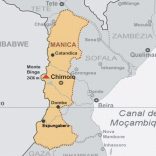Mozambique: OAM denounces police repression and torture
Moz at COP27 + Loss+Damage; Strikes over new salary scale – By Joseph Hanlon

In this issue
- Battle at COP27 over climate damage
- New salary structure triggers strike threats
- Developing countries including Mozambique force ‘Loss and Damage’ onto COP 27 agenda
Wrangling over the COP27 agenda lasted 40 hours last weekend and delayed the start of the conference, Monday (7 Nov). But in the end developing countries forced the issue of “loss and damage” onto the agenda. This is the recognition that developed countries used fossil fuels to industrialise, which damaged poorer developing countries, and the rich should pay for the harm they have done. This looks to be the biggest and most contentious issue at the climate talks.
Mozambique is still trying to raise $2 bn to repair the damage done by two cyclones three years ago which were made much worse by the climate emergency. At COP27 Mozambique is organising a high-level parallel meeting this week on Reducing Loss and Damage and Disaster Risk in Africa, chaired by President Felipe Nyusi, who was named earlier this year as the Africa Union Champion for Disaster Risk Management.
The cost to developing countries of loss and damage will be $2 trillion per year by 2030 – one thousand times the damage done by cyclones Idai and Kenneth, according to report issued Tuesday (8 Nov) by the Independent High-Level Expert Group on Climate Finance. The expert group is chaired by Nicholas Stern, who wrote the landmark 2006 review of the economics of climate change. The new report says at least $1 trillion per year must come from rich countries and development banks, and contrasts the need with “the failure to deliver the climate finance commitment of $100 bn per year by 2020 made by developed countries at successive COPs.”
But former UK prime minister Boris Johnson, speaking at a COP27 meeting Monday (7 Nov), made clear that industrialised countries have no intention of pay what he called “reparations”. “Per capita, people in the UK put a lot of carbon in the atmosphere,” he said. “But what we cannot do, I’m afraid, is make up for that with some sort of reparations, we simply do not have the financial resources.”
The response was from Mia Mottley, prime minister of Barbados, who spoke for the developing world in a blistering attack on industrialised nations at COP27. She said the prosperity – and high carbon emissions – of the rich world had been achieved at the expense of the poor in times past, and now the poor were being forced to pay again, as victims of climate breakdown that they did not cause.
“We were the ones whose blood, sweat and tears financed the industrial revolution,” she said. “Are we now to face double jeopardy by having to pay the cost as a result of those greenhouse gases from the industrial revolution? That is fundamentally unfair.”
Belgium on Monday (7 Nov) became only the third nation in the world to pledge funding for loss and damage. Minister for Development Cooperation Frank Vandenbroucke said Belgium was giving €2.5 mn euros to Mozambique explicitly for climate change “loss and damage”. (Reuters 7 Nov)
Mozambique has sent a large team to Egypt, headed by President Nyusi. With him are ministers of Agriculture and Rural Development, Celso Correia; Land and Environment, Ivete Maibasse; Transport and Communications, Mateus Magala; as well as deputy ministers of Foreign Affairs and Cooperation, Manuel Jose Gonçalves; Public Works, Housing and Water Resources, Cecilia Chamutota; Economy and Finance, Amilcar Tivane; and the Ambassador of Mozambique in Egypt, Filipe Chidumo. (Noticias 7 Nov, Financial Times 7 Nov, Guardian 7,8 Nov, Independent High Level Group 8 Nov)
- New salary structure triggers protests and strike threats
Doing the impossible in secret has proved to be beyond the capacity of the Ministry of Economy and Finance (MEF). The publication of a revised Unified Salary Structure (Tabela Salarial Única, TSU) on 19 October has triggered threats of strikes by more highly paid professionals, who feel they are losing out. Doctors had planned to strike yesterday (7 Nov) but have postponed the strike until 5 December. Nurses say they will strike Monday (14 Nov)
The Mozambican Judges Association of Judges on Friday issued a statement calling the TSU “unconstitutional and illegal”. They say it cuts some salaries and negatively affects rights previously won by this professional class. This “lowering of the professional status of judges” violates the Constitution and violates international accords, as the independence of the judiciary is no longer guaranteed. (O Pais 7 Nov)
Last week MEF staff protested outside their own ministry. Zitamar (3 Nov) reports this follows silent strikes that has been going on for months in different institutions. Doctors, teachers, nurses, police, lawyers and other professionals say the TSU has worsened pay differences in public administration, while others say it has lowered their pay status.
The TSU was intended to create a harmonised, published salary scale, ending the plethora of special subsidies for cars, housing, etc. But “in general, the TSU brings benefits to those who exercise management and leadership positions, and not to the ordinary civil servant. It devalues ordinary state employees and values those in management,” concludes a study by CIP (Portuguese only).
Creating a unified salary table requires three extremely difficult and controversial choices. The first is to rank in 21 bands all civil servants. Do doctors rank higher or lower than judges, members of parliament, national directors, district administrators, etc? And what is the gap between a hospital director and a doctor on the hospital wards. The choices go on and on.
In the basic salary scale published in July a hospital nursing director is scale 12A ($800 a month plus supplements) while a hospital director is scale 15 ($1137).
The second issue is what is the balance between experience and formal education. Many middle level staff who have been in the civil service for decades have gained valuable experience that keeps organisations operating. Meanwhile younger people who had more educational opportunity join with university degrees, and complain that less educated people below them are paid more because of the salary component based on length of service.
The third issue is balancing major changes within a declining budget. Until now the government wage bill has been steadily increasing. But Mozambique has agreed with the IMF to a 17% cut in the total government wage bill by 2026 (see our calculation, newsletter 606, 9 Oct). Any increase to pay the various protestors will mean ignoring the IMF cap. And the IMF expects Mozambique to keep moving forward with reforms, despite challenges to the new wage scale, the IMF’s resident representative in Mozambique, Alexis Meyer-Cirkel, said yesterday (7 Nov). (Lusa 8 Nov)
All three issues are politically sensitive because they involve competing interests. MEF tried to decide in secret and impose its choices, which is clearly failing. Now it is negotiating with interest groups such as doctors and judges, which can only result in more money for the better paid and organised, and less for ordinary teachers and other lower paid civil servants. What is missing is some sort of public discussion about how to divide the shrinking salary pie.
MEF has posted nine laws, decrees and other documents on the TSU on: https://mef.gov.mz/index.php/publicacoes/legislacao-dngrh/tabela-salarial-unica-tsu
By Joseph Hanlon












Leave a Reply
Be the First to Comment!
You must be logged in to post a comment.
You must be logged in to post a comment.